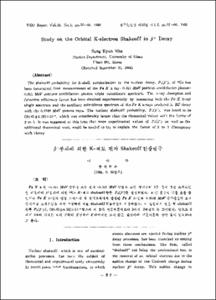대장암의 조기진단
- Alternative Title
- Early Detection in the Colorectal Carcinoma
- Abstract
- Colorectal carcinoma increases with aging and 94% of them occur after 6th decade. Five-year survival rate in the localized lesion has shown to be 91% in colonic and 84% in rectal carcinoma, while decreased to 60% and 50% respectively in the carcinoma with regional infiltration. Digital rectal examination, fecal occult blood test and sigmoidoscopy have been proven as effective screening tools to detect early or precancerous lesion, and sigmoidoscopy could be recommendable after 6th decade. Screening in the moderate risk group needs to meet several requirement, e.g., non-invasiveness, good compliance, low false-positive and false-negative with good predictability, and costs lower than total expense in treating advanced carcinoma. The American Cancer Society recommends to begin annual digital rectal examination and fecal occult blood testing at age forty, and flexible sigmoidoscopic examination every three or five year after two normal annual examinations at age fifty. This guideline can be also effective and applicable in Korean population considering recent increase in colorectal carcinoma, though the beginning of screening may be delayed for five or ten years later. Screening in the high risk group must be performed as a regular base considering respective prevalence and risk in the family members.
Colorectal carcinoma increases with aging and 94% of them occur after 6th decade. Five-year survival rate in the localized lesion has shown to be 91% in colonic and 84% in rectal carcinoma, while decreased to 60% and 50% respectively in the carcinoma with regional infiltration. Digital rectal examination, fecal occult blood test and sigmoidoscopy have been proven as effective screening tools to detect early or precancerous lesion, and sigmoidoscopy could be recommendable after 6th decade. Screening in the moderate risk group needs to meet several requirement, e.g., non-invasiveness, good compliance, low false-positive and false-negative with good predictability, and costs lower than total expense in treating advanced carcinoma. The American Cancer Society recommends to begin annual digital rectal examination and fecal occult blood testing at age forty, and flexible sigmoidoscopic examination every three or five year after two normal annual examinations at age fifty. This guideline can be also effective and applicable in Korean population considering recent increase in colorectal carcinoma, though the beginning of screening may be delayed for five or ten years later. Screening in the high risk group must be performed as a regular base considering respective prevalence and risk in the family members.
- Issued Date
- 1993
- Type
- Research Laboratory
- Alternative Author(s)
- Kim, Jin Cheon
- Publisher
- 울산의대학술지
- Language
- kor
- Rights
- 울산대학교 저작물은 저작권에 의해 보호받습니다.
- Citation Volume
- 2
- Citation Number
- 2
- Citation Start Page
- 33
- Citation End Page
- 39
- Appears in Collections:
- Research Laboratory > The ULSAN university medical journal
- 파일 목록
-
-
Download
 000002025570.pdf
기타 데이터 / 577.72 kB / Adobe PDF
000002025570.pdf
기타 데이터 / 577.72 kB / Adobe PDF
-
Items in Repository are protected by copyright, with all rights reserved, unless otherwise indicated.